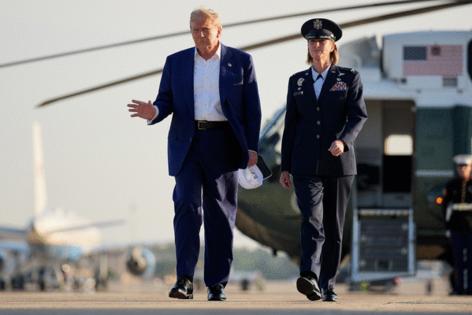Trump truce gains ground as UN nuclear watchdog seeks Iran access
Published in News & Features
Israel and Iran appeared to be honoring a ceasefire brokered by Donald Trump after the U.S. president lashed out at both sides for early breaches, while the U.N. nuclear watchdog urged a rapid resumption of inspections at Iranian atomic sites amid reports that U.S. bombing failed to completely destroy them.
Both warring Mideast nations said they’d honor the truce provided their enemy did likewise. There have been no reported attacks since the ones in the ceasefire’s early hours that enraged Trump. “DO NOT DROP THOSE BOMBS,” he wrote in a social media post directed at Israel in particular.
The president’s bid to end the 12-day conflict, which threatened to escalate into a wider regional war and upend energy markets, came just two days after he ordered U.S. forces to join the Israeli attack by bombing three key nuclear facilities. Trump said they had been “obliterated.” But satellite images don’t provide conclusive evidence that the most heavily protected underground sites were breached.
The New York Times and CNN — citing U.S. Defense Intelligence Agency findings — reported Tuesday that Iran’s atomic program had only been set back by months, with some core components intact. White House spokeswoman Karoline Leavitt called the CNN report “flat-out wrong.”
The prospect of de-escalation between Israel and Iran has triggered a slump in oil prices — erasing almost all of the increase since the conflict broke out. The truce remains fragile as the focus shifts back to nuclear diplomacy. A stated aim of U.S. and Israeli strikes was to destroy Iran’s ability to develop a nuclear weapon, adding urgency to assessments of how much damage was done.
International Atomic Energy Agency chief Rafael Grossi told Fox News that the country’s atomic program “has been set back significantly,” adding that it’s hard to specify whether that means months or years.
Grossi said inspections should resume “as soon as possible” to determine what’s happened to Iran’s stocks of uranium enriched to 60% levels, not far short of the 90% required to build a bomb. The IAEA says it last verified those inventories a few days before Israel’s June 13 attack, and their whereabouts is now unknown.
Early Tuesday, Trump’s frustration with ceasefire breaches boiled over when he stopped to take questions from reporters before heading to a NATO summit in The Hague. “We basically have two countries that have been fighting so long and so hard that they don’t know what the f--- they’re doing,” he told them on the South Lawn of the White House, before marching toward the presidential helicopter.
The president’s tone later cooled. In comments to reporters aboard Air Force One en route to the summit, Trump reiterated what he’d maintained was the U.S. goal in nuclear talks with Iran. “They’re not going to have enrichment and they’re not going to have a nuclear weapon,” he said.
Israel’s attack on Iran came after five rounds of negotiations between the U.S. and the Islamic Republic, which sought a diplomatic solution to concerns over Iran’s nuclear program — effectively a replacement for the 2015 nuclear deal that Trump abandoned during his first term. An agreement hadn’t been reached, though a sixth round was scheduled before the Israeli missiles rendered it obsolete.
Tehran has insisted on its rights under international law to enrich uranium for civilian purposes. In calls with regional counterparts reported by state media on Tuesday, Iranian President Masoud Pezeshkian appeared to reiterate that stance.
“The Islamic Republic of Iran is solely pursuing its legitimate rights and has no ambitions beyond that,” he told UAE counterparts. “ Iran has never sought nuclear weapons and doesn’t seek them.”
Trump had said Iran was “weeks away” from having a nuclear bomb, though some experts and U.S. intelligence estimates said it could take months or years for the nation to develop a weapon.
Trump hinted at the kind of relief from his “maximum pressure” campaign Iran might expect if talks advance, saying on social media that China can continue buying Iranian oil in the light of the cease-fire. It wasn’t immediately clear how that pronouncement — which would essentially reverse years of sanctions — could be implemented by the U.S. Treasury and Congress.
Oil prices — which began to slide the previous day when Iran’s limited response to U.S. attacks signaled that both countries were seeking an off-ramp — extended declines on those comments. Brent crude fell below $68 a barrel as of 4 p.m. in New York — a drop of some 12% from Friday’s close.
A senior White House official said Trump brokered the ceasefire in a conversation with Netanyahu on Monday, while Vice President JD Vance, Secretary of State Marco Rubio and special envoy Steve Witkoff held direct and indirect talks with the Iranians about the proposal. Congress was due to get briefings on the U.S. bombing of Iran Tuesday, but those sessions have been postponed.
Since the war started, 606 people have been killed in Iran, according to the government. In Israel, emergency services have said 28 people have been killed by Iranian missile strikes, including four on Tuesday morning just as the truce was due to take effect.
Israeli authorities said Tuesday that wartime safety directives have been lifted. Prime Minister Benjamin Netanyahu told the nation that immediate threats from Iran’s nuclear program and ballistic missiles had been eliminated — though his military chief Eyal Zamir cautioned that “the campaign against Iran is not over.”
_____
(With assistance from Arsalan Shahla, Hayley Warren, Demetrios Pogkas, Tyler Clifford and Jonathan Tirone.)
©2025 Bloomberg L.P. Visit bloomberg.com. Distributed by Tribune Content Agency, LLC.







Comments